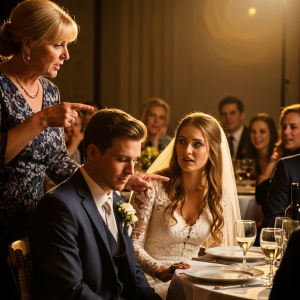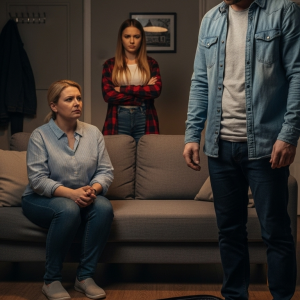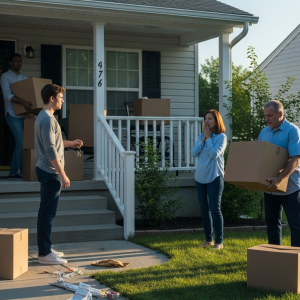I always knew I wasn’t the golden child. My brother, Morris, was the planned one—good grades, varsity jacket, the whole package. I was, according to my mom’s dinner party jokes, “what happens when you trust cheap pharmacy-brand birth control.” Hilarious, right? I grew up thinking it was normal for your mom to use you as a punchline. You adapt. I learned to smile through the jabs, developing a kind of emotional callous.
The night everything changed was for my mom’s birthday celebration. Not the actual family dinner, but two days later, when she invited her work friends over—the country club crowd she was desperately trying to impress. Mom went full Pinterest-mode for the dinner: new placemats, scented candles, the good plates that normally collected dust. Dad was instructed to wear his one decent button-up shirt and to stay under five drinks. Morris got the “be impressive” talk. I got nothing, not even a “please don’t embarrass me.” That should have been my first clue.
The night started with me playing server. “Michael, be useful for once,” my dad had muttered. I passed around appetizers while Mom told exaggerated stories about Morris’s baseball scholarship prospects. I was invisible, which was the best-case scenario.
Then, a woman with an “I want to speak to the manager” haircut commented on how expensive kids are these days. That’s when it happened. My mom, four glasses of white wine deep, got that look I knew too well—the “I’ve got a real zinger” look. She pointed a perfectly manicured finger directly at me as I was collecting empty glasses.
“Birth control’s only 99% effective,” she announced, pausing for dramatic effect. “He’s the 1%.”
The room erupted in laughter. Even my dad, who usually just existed in a quiet haze at these events, let out a booming laugh. I stood there, holding their dirty glasses, while they all laughed at the fact that I was never supposed to exist. Morris wasn’t laughing; he was staring at his plate, his ears bright red. At least someone in that room had the decency to feel shame.
But my mom wasn’t done. “We already had our perfect kid,” she added, gesturing to Morris. “Michael here is what we call the family mistake.”
More laughter. Someone, I think it was my dad’s boss, actually said, “Ouch, bet that’s going to leave a mark.”
I didn’t scream. I didn’t throw the glasses. I just set them down carefully on the table, walked upstairs to my room, and shut the door. Nobody noticed.
I sat on my bed, and something inside me just clicked off. The emotional screen went blue, then black. I knew I was leaving. I grabbed my school backpack, dumped out the textbooks—who needs trigonometry when you’re about to be homeless?—and packed the essentials: a few t-shirts, my phone charger, and the forty dollars my grandma had given me for my birthday.
Morris came up while I was packing. He didn’t say much; he knew this was coming. He handed me $120 from his own savings and his old, disconnected phone. “They won’t even notice you’re gone until tomorrow afternoon,” he said, not as an accusation, but as a statement of fact.
I almost broke then. But then I heard more laughter from downstairs, my mom’s voice carrying up, complaining about “teenager attitude problems.”
Nope. I was done.
That first year was a blur of 12-hour days washing dishes, sleeping on a friend-of-a-friend’s couch, and surviving on instant ramen. I got my GED at seventeen and started working renovation jobs with a guy named Ronnie, who’d taken pity on me. He’d had his own family issues and understood.
Morris kept in touch through a throwaway email account. He told me Mom had cried for the cameras when she reported me missing, then complained about me being “dramatic” when the police left. Dad got drunk and said I’d be back when I got hungry enough. They filed a missing person’s report that went nowhere; they just weren’t trying very hard to find their “mistake.” By my seventeenth birthday, they had turned my room into a home gym.
That’s when I decided this wasn’t just about escaping anymore. It was about becoming someone they’d regret losing. The anger that had fueled my escape cooled into something harder, more calculated. I started thinking about money not just as survival, but as power. Every paycheck, every online community college class, every new skill I learned was another brick in the wall I was building between myself and that dinner table.
By the time I was twenty-two, I had my own life. A small apartment, a steady job in construction management, and a chosen family of friends who actually cared. I had met Zoe, a paralegal student who understood the language of dysfunctional families. She didn’t see my past as baggage; she saw it as a source of strength. She helped me see that what I had endured wasn’t normal, that love shouldn’t be conditional.
Morris was the only one from my old life who knew where I was, and he had sworn to secrecy. Or he had, until last week. He called, his voice tense. “They’re looking for you,” he warned. “Dad got laid off. The house is in pre-foreclosure. They need something.”
It turned out the Bank of Karma was finally calling in their debt. And I, the family mistake, was about to become the collections agent they never saw coming.
The first contact was a dramatic Facebook post from my mother, complete with an old school photo of me. “Missing my baby boy every day. Please share to help us find Michael. #comehome.” The same woman who had turned my bedroom into a gym was now performing the role of a grieving mother for an audience of sympathetic strangers.
The comments were a goldmine of hypocrisy. “Didn’t you say he joined the military?” and my personal favorite, “Isn’t that the room you turned into your gym?”
They found me, of course. A neighbor in my apartment complex recognized my photo from a community page. Three days ago, my buzzer rang. It was them. They looked older, more desperate. Dad had lost weight, the alcohol bloat replaced by a gaunt weariness. Mom was clutching her purse like a life raft.
I let them in. They stood awkwardly in my living room, their eyes darting around, taking in the evidence that I wasn’t just surviving; I was stable. Mom launched into a tearful performance about how many nights she’d cried herself to sleep. Dad tried to play the stoic, concerned father.
“Why are you here?” I asked, cutting through the theatrics.
The facade cracked. The truth spilled out in a torrent of self-pity and entitlement. They were losing the house. The bank was coming. They needed money. They needed me to fix it.
“Why haven’t you asked Morris for help?” I inquired.
They had. Morris had given them what he could, but he had his own life, his own student loans. He had set boundaries. So, they had tracked down their backup plan.
I listened as the number they needed kept growing. I watched them size up my apartment, mentally calculating what they could extract from me. After twenty minutes, I showed them out, promising to call. The moment the door closed, I had a minor breakdown, a strange mix of laughter and tears.
Zoe found me on the floor. She didn’t offer platitudes. She just sat with me until the storm passed. That night, we finalized the plan. I had been preparing for this moment for years, and not just by saving money. With Zoe’s paralegal knowledge, I had taken a preemptive strike. Three months earlier, through an LLC, I had anonymously bought my parents’ mortgage from the bank. They didn’t know it, but for the last ninety days, they had been living in my house.
I invited them to dinner at a neutral restaurant. When they arrived, they found not just me, but Zoe, Morris, who had flown in that morning, and my old boss Ronnie—my real family. Mom’s face fell when she realized this wasn’t a private negotiation.
I let the silence hang in the air before I began. “I know about the mortgage,” I said.
Their expressions shifted from confusion to a flicker of hope. They thought I was about to offer a bailout.
Instead, I placed a thick folder on the table. “I know about it because I own it,” I said calmly. “The house is legally my property.”
The color drained from my mother’s face. My dad went rigid, his knuckles white as he gripped the table.
I laid out my terms. One: They would make a public statement to their friends and family, telling the truth about why I left and acknowledging their behavior. The same people who had laughed at their jokes needed to hear the rest of the story. Two: They would attend family counseling with me and Morris, not for reconciliation, but for them to finally listen. Three: They would sign a legally binding agreement never to ask me for financial assistance again.
If they met these conditions, I would sign the house over to them, free and clear.
My mother began to sob, but these were real tears of shock and defeat. My dad stared at the documents, his bravado completely gone.
Morris spoke for the first time, his voice steady. “You should be grateful. He’s offering you more fairness than you ever showed him.”
They left without agreeing, but they had no choice. Forty-eight hours later, they signed the papers.
The aftermath has been… complicated. The public apology was a masterpiece of self-pity, but it was made. The therapy sessions are excruciatingly awkward. But for the first time, they are being held accountable.
Is this revenge? I guess. But it feels more like balancing the books. The anger isn’t gone, but it’s different now—a scar that’s finally closed over. Last night, Zoe and I were talking about the future, about getting a dog, about our life together. She asked if I regretted any of it.
I thought about that sixteen-year-old kid with forty dollars in his pocket, walking into the night with nowhere to go. I thought about who I had to become to survive.
“No,” I told her, and I meant it. “I don’t regret it. Some mistakes turn out to be the best decisions you ever make.”
The first counseling session was held in a nondescript office above a strip mall, the kind of place where the waiting room smelled faintly of burnt coffee and old carpet.
Morris and I got there early, mostly to choose our seats. I wanted to be by the window — I needed an escape route, even if it was just visual.
When Mom and Dad walked in, they looked like they’d just stepped out of a silent argument in the car. Mom’s lipstick was slightly smudged; Dad’s jaw was tight enough to crack. They avoided eye contact with me and Morris, pretending to be fascinated by a stack of outdated National Geographic magazines.
The therapist, a middle-aged woman named Dr. Feldman, had one of those calm, unshakable voices that made you think she’d seen it all — divorces, midlife crises, probably even an exorcism or two.
We introduced ourselves, though she clearly already knew the bullet points from the intake forms.
“I understand there’s a lot of history here,” she began, “and that some recent events have brought that history to the surface. Michael, why don’t you start?”
I glanced at my parents. “Sure. I grew up being the punchline. Mom had her ‘family mistake’ joke. Dad had his ‘be useful for once’ mantra. I left at sixteen because I knew staying meant becoming the doormat forever. You didn’t notice until you needed something from me. And when you did find me, it was because your house — my house — was in pre-foreclosure, and you saw me as a bailout, not a son.”
Dr. Feldman looked at my parents. “Would you like to respond?”
Dad’s voice was gruff. “We did the best we could.”
“No,” I said, leaning forward, “you did the best you could for Morris. I got the leftovers, if that.”
Mom sighed like she was already exhausted. “Michael, you’ve always been so… sensitive. It was just humor.”
“Humor’s only funny when everyone’s laughing,” I shot back. “I wasn’t.”
The rest of that session was a chess game — me laying down facts, them trying to dodge with vague nostalgia or deflecting to “the past is the past.” Morris stepped in a few times, backing me up, reminding them of things they didn’t think anyone remembered. By the end, Dr. Feldman had a whole page of “specific incidents” for follow-up. My parents had a page of “homework” — actual written apologies for three events from my childhood, to be read aloud next session.
It was brutal. And honestly? A little satisfying.
The public apology was its own kind of theater.
Per our agreement, they had to post it on their joint Facebook account — the same account that had “shared” my missing poster for likes just months ago.
I gave them the text. They grumbled but didn’t change a word: “To our friends, neighbors, and extended family — for years, we told jokes and made comments at Michael’s expense that were cruel, hurtful, and untrue. We dismissed his feelings and did not treat him with the respect and love he deserved as our son. This behavior led to a long estrangement, for which we take full responsibility. We are in counseling now to rebuild trust and to become the kind of parents we should have been from the start.”
It went live at 6:03 p.m. By 6:07, the comments section was on fire.
Some were supportive: “Takes courage to admit mistakes. Proud of you for trying.”
Some were skeptical: “Sounds like someone’s lawyer made them post this.”
And some were downright gleeful: “Guess karma finally RSVP’d to that dinner party, huh?”
They got flooded with private messages from old friends, distant cousins, even former co-workers who remembered “the jokes.” My mom, who thrived on her polished public image, suddenly found herself at the center of a gossip storm. Dad stayed off Facebook entirely, which was probably for the best.
Behind the scenes, I made my next quiet move.
Owning their mortgage was leverage, but it wasn’t the endgame. I had already set up a clause in the property paperwork: if they defaulted again, the deed wouldn’t just revert to me — it would automatically transfer to a charitable housing trust I’d partnered with, no court battle required.
They didn’t know that part. Yet.
Zoe and I talked about it one night while making dinner.
“Do you want them to know?” she asked.
“Not right now,” I said. “Right now, they need to think the only way to keep the house is to keep their word.”
“And later?”
“Later, if they break the deal, I won’t be the one taking their home. It’ll be someone who’ll actually do something good with it.”
Zoe smiled. “That’s diabolical.”
“It’s ethical,” I said. “And yes, maybe a little diabolical.”
Therapy dragged on for weeks. My parents never outright admitted everything, but they admitted enough to put cracks in their own narratives.
One session, Mom read her homework apology for the “1%” joke. She couldn’t even make eye contact. Dad mumbled something about regretting not standing up for me.
It wasn’t warm, it wasn’t tearful reconciliation — but it was accountability, and that was more than I ever expected.
Morris benefited too. Without the “perfect child” pedestal, he could finally breathe. We started hanging out more, just as brothers, no parental agenda hovering over us. He came over one Saturday to help me and Zoe paint the kitchen, and halfway through, he said, “You know… you’re the one who taught me it’s okay to set boundaries. I just wish I’d learned it sooner.”
The real turning point came at the six-month mark.
Per the agreement, they hadn’t asked me for money or favors. But now they tried a side-door approach:
Mom emailed Zoe.
It was a long, syrupy message about “keeping family connected” and “how hard the electric bill has been this winter.” Zoe forwarded it to me without a word.
I printed it. At the next therapy session, I slid it across the table to Dr. Feldman.
Mom’s face went pale.
“This is exactly what we discussed not doing,” Dr. Feldman said evenly. “Michael, how do you want to proceed?”
“I’m amending the agreement,” I said. “One more violation, and the mortgage is terminated. No more conditions. No more counseling. You’ll be tenants until the trust finds you a new place.”
Dad tried to bluster, but he’d lost his old volume.
Mom just nodded stiffly.
That summer, Zoe and I adopted a dog — a scrappy, one-eyed rescue mutt named Captain. He became my shadow, curling up in my office while I worked, trotting beside me on early morning walks. It was stupidly therapeutic to have something in my life that was just… uncomplicatedly happy to see me.
Morris came by often, sometimes with beer, sometimes with nothing but a willingness to sit on the porch and talk. He told me he’d been offered a coaching job in another state and was thinking about taking it.
“You should,” I said. “Live somewhere their shadow can’t reach.”
“Yeah,” he smiled. “Guess I learned from the best escape artist.”
The last time I saw my parents in person was about a year after the first counseling session.
They had made it to every appointment, posted the apology, kept the direct asks at bay. But we all knew the relationship wasn’t magically healed. There were too many years of rot under the floorboards.
At that final session, Dr. Feldman asked if we wanted to continue.
I said no.
Mom looked like she wanted to argue, but Dad just nodded, almost in relief.
We walked out of that office, and I realized I wasn’t angry anymore. Not because they’d changed into the parents I needed — they hadn’t — but because they didn’t have power over me anymore. The sixteen-year-old kid with a backpack and forty bucks was gone.
Now, I had a home they couldn’t touch, a partner who had my back, a brother who was his own person, and a life built entirely outside the blueprint they’d drawn for me.
Two months later, I got a letter from the mortgage servicer I technically still controlled. The payment had been missed. Then another. And just like that, the clause activated.
The deed transferred to the housing trust. They had ninety days to vacate.
I didn’t gloat. I didn’t call. I didn’t even drive by. I just got an email from the trust director saying the house was being renovated to serve as transitional housing for single parents.
That felt better than any revenge fantasy I’d ever played in my head.
They lost the house, but it wasn’t to me — it was to a cause that actually mattered. The “family mistake” had turned their last stronghold into a safe haven for strangers.
One evening, sitting on the porch with Captain at my feet and Zoe beside me, Morris called.
“They’re moving into some rental across town,” he said. “Mom’s telling everyone the bank screwed them. Not a word about you.”
“Let her,” I said. “The people who matter know the truth.”
Zoe looked at me, curious. “Do you ever wish they’d apologize for real?”
I thought about it. “Not really. I don’t need it anymore. The apology I wanted was a life where they didn’t control me. I’ve got that now.”
Captain barked at a passing car, and I reached down to scratch his head.
Morris laughed over the phone. “You sound… happy.”
“I am,” I said. And I meant it.




